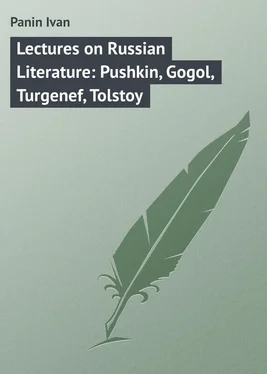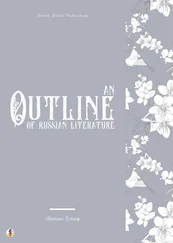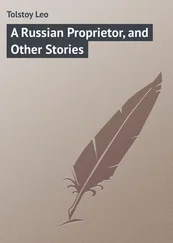Ivan Panin - Lectures on Russian Literature - Pushkin, Gogol, Turgenef, Tolstoy
Здесь есть возможность читать онлайн «Ivan Panin - Lectures on Russian Literature - Pushkin, Gogol, Turgenef, Tolstoy» — ознакомительный отрывок электронной книги совершенно бесплатно, а после прочтения отрывка купить полную версию. В некоторых случаях можно слушать аудио, скачать через торрент в формате fb2 и присутствует краткое содержание. Жанр: Русская классическая проза, на английском языке. Описание произведения, (предисловие) а так же отзывы посетителей доступны на портале библиотеки ЛибКат.
- Название:Lectures on Russian Literature: Pushkin, Gogol, Turgenef, Tolstoy
- Автор:
- Жанр:
- Год:неизвестен
- ISBN:нет данных
- Рейтинг книги:3 / 5. Голосов: 1
-
Избранное:Добавить в избранное
- Отзывы:
-
Ваша оценка:
- 60
- 1
- 2
- 3
- 4
- 5
Lectures on Russian Literature: Pushkin, Gogol, Turgenef, Tolstoy: краткое содержание, описание и аннотация
Предлагаем к чтению аннотацию, описание, краткое содержание или предисловие (зависит от того, что написал сам автор книги «Lectures on Russian Literature: Pushkin, Gogol, Turgenef, Tolstoy»). Если вы не нашли необходимую информацию о книге — напишите в комментариях, мы постараемся отыскать её.
Lectures on Russian Literature: Pushkin, Gogol, Turgenef, Tolstoy — читать онлайн ознакомительный отрывок
Ниже представлен текст книги, разбитый по страницам. Система сохранения места последней прочитанной страницы, позволяет с удобством читать онлайн бесплатно книгу «Lectures on Russian Literature: Pushkin, Gogol, Turgenef, Tolstoy», без необходимости каждый раз заново искать на чём Вы остановились. Поставьте закладку, и сможете в любой момент перейти на страницу, на которой закончили чтение.
Интервал:
Закладка:
28. From this sincerity of Russian writers comes the third great virtue of Russian literature, a virtue possessed as yet by other literatures in but a small degree. The Russian writer is first of all in earnest, and he has no time to give to mere entertainment, mere amusement. The Goldsmiths with their Bees and their Citizens of the World, the Addisons with their Spectators, nobly writ though these be, yet written mostly with no higher purpose than to make the breakfast-roll glide down the throat more softly, – these exist not in Russia. Things of beauty, things of entertainment, like Addison's Essays, are indeed found in Russia; but not for entertainment alone were these writ, hence not in the strain of mirth. Rather are they writ with the blood of the heart; for to the Russian, “Life is real, life is earnest,” not a mere pastime, and it was given to a Russian painter to make the all-known but singularly-forgotten observation that Christ never – laughed!
29. But while the native endowment of the soul, its spiritual capital, is the chief guide of the fate of literature, other forces also affect its course, the chief among which is the political government of the people. In most countries the influence of government upon literature has been slight. Shakespeare's plays, Milton's Paradise, were not affected by the political struggles of England. The sole writing of Milton which was affected by English politics, his prose, belongs to literature only in so far as it throws light on the author of Paradise Lost. Dante's Divine Comedy, charged though it be with the political electricity of his times, was but little affected by the state of government. In other countries the government of the people was as much itself an effect of the native endowment of the soul as its literature; and government and literature flowed therefore side by side, in two parallel streams, seldom interfering with each other's course. In Russia, however, government has extended a powerful influence on literature, and the most marked effect of its influence is the short-livedness of most Russian authors. The calm, peaceful existence of the literary man has already been sung by Carlyle as a life-lengthener. In Russia, however, the same fatality which has pursued its political rulers has also pursued its spiritual rulers; and as most conquerors have died an unnatural death, so most writers have died an unnatural death, or only after an unnatural life. The witticism of Mark Twain, that the bed must be a most fatal place, since most people die in bed, is not applicable to Russian emperors and Russian writers. Few of them can be said to have died in their beds. Griboyedof is assassinated; Pushkin and Lermontof are murdered; Gogol is found dead from bodily starvation, and Byelinsky is found dead from spiritual starvation; Batushkof dies insane; Dostoyefsky and Chernishefsky are in prison the best years of their lives; Turgenef can find the length of his days only in exile, and Tolstoy the length of his in ploughing fields. For such a strange disharmony in the lives of Russian men of letters, the government is largely responsible. An autocracy which feels itself called to wrap literature tightly in swaddling-clothes, and establishes a censorship which does not shrink even from making verbal changes in the works of the artist to improve his style, can accomplish little more than the shortening of literary lives. For literature is a flower which can only wither at the touch of unhallowed hands, and the rude hands of the censor are far from being hallowed.
30. Hence Russian literature not only is a mere fragment, a mere brick of the vast edifice which it is capable of becoming; it is even bound to remain a mere fragment for a long time to come. For as Socrates lived in Plato, Plato in Aristotle, and Aristotle in the Schoolmen, as Lessing lived in Goethe, Goethe in Heine, and Heine in young Germany, so great literary fathers reappear in the progeny of the next generation; the reproduction is indeed oft puny enough, still the reproduction is there. But in Russia, while Pushkin lived in Gogol, and Gogol in Turgenef, the generation which was to inherit the kingdom left by Turgenef and Tolstoy is now buried in fortresses and dungeons. And as in America mammon has so eaten away literary aspiration as to leave Emerson and Hawthorne, Prescott and Motley, intellectually childless, so in Russia, autocracy has so eaten away the literary material as to leave the great masters childless.
31. Fortunately, though deprived by despotism of all power of propagation on Russian soil, the noble spirit of Russian literature has by a force I cannot but call divine been allowed to be propagated on foreign soil; and if the literature of the west, which is now stagnating in the pools of doubt, irreverence, mammon, and cold intellectualism, misnamed culture, is to be purified, the purification must come from the breath of Life which blows from Russia. This is the true meaning of the present craze for Russian authors. There is a force in them which the mass instinctively recognizes as divine; it feels for it, gropes for it, and the Devil, as usual, is the first to seize for his purposes whatever noble impulse comes over men, and this search for the divine of the mass becomes a sham, a fashionable craze. Hence the rage, the boom. This is the inevitable stage of falsehood through which every noble aspiration must pass. By and by the stage of truth must come, and come it shall, in due time. Russian authors will then be read not because it is the fashion and the craze, but because they have a message from the very heavens to deliver unto him that hath eyes to see and ears to hear: the message of sincerity, the message of earnestness, the message of love. Then will have been reached the stage of truth.
32. Out of this crampedness of Russian literature by government developed that virtue of its masters, which with their sincerity and simplicity, or moderation, forms a most beautiful trinity of graces; I mean their freedom. You will indeed hear full many a yard-stick critic as he goes about with his load of pigeon-holed boxes to take measure of each author, and label him, and duly relegate him to convenient pigeon-hole, – such critic you will hear discourse much about classicism, and romanticism, and realism, and of their prevalence at different times in Russian literature. Believe it not! The Russian author who is at all worth classifying is slave of no school; he is free, for he is a worshipper of the truth which alone maketh men free, he is a school unto himself. Is Gogol a realist? He gives you indeed the reality, but he breathes into it a beauty only visible to idealizing eyes. Is Turgenef a realist? When thrilled with the unspeakable beauty of the sky, he depicts it so as to realize for you the ideal. And when Tolstoy is thrilled with a moral emotion, he depicts it so as to idealize the real for you. The Russians thus refuse to be classified. And they belong to only one class, – the class of those that cannot be classified.
33. Thus has it come to pass that the west, to which Russian literature owes its nourishment, is now in its old age to be nourished by its foster child. The child is to become the father of the man; and Russian literature is henceforth to be the source of the regeneration of the western spirit. As the future fighters for freedom will have to look to the Perofskayas, to the Bardines, and the Zassulitshes, and to the unnamed countless victims of the Siberian snow-fields for models of heroism, so methinks henceforth writers must look to the Russians for models in their art: to Gogol for pure humor, to Turgenef for the worship of natural beauty, to Tolstoy for the worship of moral beauty.
LECTURE II.
PUSHKIN
1. I have stated in the first lecture that I should treat of Pushkin as the singer. Pushkin has indeed done much besides singing. He has written not only lyrics and ballads but also tales: tales in prose and tales in verse; he has written novels, a drama, and even a history. He has thus roamed far and wide, still he is only a singer. And even a cursory glance at his works is enough to show the place which belongs to him. I say belongs, because the place he holds has a prominence out of proportion to the merits of the writer. Among the blind the one-eyed is king, and the one-eyed Pushkin – for the moral eye is totally lacking in this man – came when there as yet was no genuine song in Russia, but mere noise, reverberation of sounding brass; and Pushkin was hailed as the voice of voices, because amidst the universal din his was at least clear. Of his most ambitious works, “Boris Godunof” is not a drama, with a central idea struggling in the breast of the poet for embodiment in art, but merely a series of well-painted pictures, and painted not for the soul, but only for the eye. His “Eugene Onyegin” contains many fine verses, much wit, much biting satire, much bitter scorn, but no indignation burning out of the righteous heart. His satire makes you smile, but fails to rouse you to indignation. In his “Onyegin,” Pushkin often pleases you, but he never stirs you. Pushkin is in literature what the polished club-man is in society. In society the man who can repeat the most bon-mots, tell the most amusing anecdotes, and talk most fluently, holds the ear more closely than he that speaks from the heart. So Pushkin holds his place in literature because he is brilliant, because his verse is polished, his language chosen, his wit pointed, his prick stinging. But he has no aspiration, no hope; he has none of the elements which make the writings of the truly great helpful. Pushkin, in short, has nothing to give. Since to be able to give one must have, and Pushkin was a spiritual pauper.
Читать дальшеИнтервал:
Закладка:
Похожие книги на «Lectures on Russian Literature: Pushkin, Gogol, Turgenef, Tolstoy»
Представляем Вашему вниманию похожие книги на «Lectures on Russian Literature: Pushkin, Gogol, Turgenef, Tolstoy» списком для выбора. Мы отобрали схожую по названию и смыслу литературу в надежде предоставить читателям больше вариантов отыскать новые, интересные, ещё непрочитанные произведения.
Обсуждение, отзывы о книге «Lectures on Russian Literature: Pushkin, Gogol, Turgenef, Tolstoy» и просто собственные мнения читателей. Оставьте ваши комментарии, напишите, что Вы думаете о произведении, его смысле или главных героях. Укажите что конкретно понравилось, а что нет, и почему Вы так считаете.












